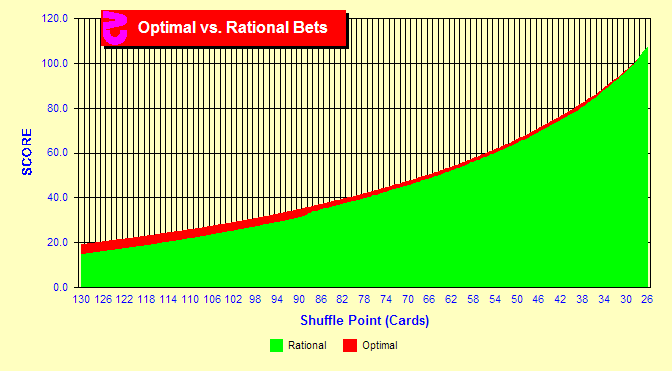 How
much is lost with rational bet sizes? How
much is lost with rational bet sizes?
Optimal bets provide us with the highest SCORE. But some people
consider this useless because you cannot bet perfectly optimally.
That is, an optimal bet might be $37. But no one bets oddball numbers
like this. Clearly we need to round these bets off to a reasonable
number of chips. For example, suppose we take the same game with
a bet spread of 25 and a penetration of 4.5 out of 6 decks. The
optimal integer bets are $8, $37, $80, $123, $170 & $200. Let's
change this to a more reasonable set of bets: $10, $25, $50, $125,
$200, $250. How much does this damage our SCORE?
This chart plots optimal versus rational betting SCOREs for every
penetration from 26 to 130 cards cut off. The bets are recalculated
for each different penetration. The top of the red area displays
the optimal SCOREs. Green provides SCOREs for rational, not quite
optimal, sets of bets. The red area signifies the loss from switching
to rational bets. You will see a couple of jogs in the green line.
This is because the unit size changes as penetration changes and
some unit sizes are more difficult to rationalize than others. What
this chart shows is there is some loss from using the non-optimal
bets — but not as much as might be feared and certainly not
enough to invalidate the methodology for making comparisons. In
fact the point of using SCOREs for comparisons is that you cannot
pick a betting ramp that works well for one strategy and not for
another. It should also be noted that these SCOREs are all far higher
than we would see without using optimal betting theory at all.
Note: If you do not use optimal betting to compare strategies,
you will need to come up with an arbitrary betting ramp. An arbitrary
ramp will always work better for one strategy than another. A skeptical
person might say this is why every book claims that the strategy
in that book has a higher advantage than other strategies.
Advanced note: Correctly rationalizing bets requires more than
simply rounding to common bet sizes. An iterative process is required
to avoid over- or underbetting. Otherwise you might end up rounding
all bets up or down.
|